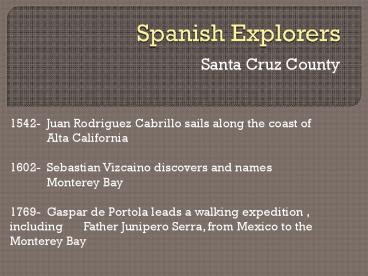Spanish Explorers - PowerPoint PPT Presentation
1 / 6
Title:
Spanish Explorers
Description:
... Crespi and Miguel Costanso recorded the events of the expedition. ... historical events and describe how each period of settlement left its mark on the land. ... – PowerPoint PPT presentation
Number of Views:839
Avg rating:3.0/5.0
Title: Spanish Explorers
1
Spanish Explorers
- Santa Cruz County
1542- Juan Rodriguez Cabrillo sails along the
coast of Alta California 1602- Sebastian
Vizcaino discovers and names Monterey Bay
1769- Gaspar de Portola leads a walking
expedition , including Father Junipero Serra,
from Mexico to the Monterey Bay
2
Juan Rodriguez Cabrillo
In 1542, Juan Rodriguez Cabrillo set off to
explore the Pacific Coast in search of a
northern route connecting the Pacific and
Atlantic Ocean called the "Straits of Anian.
It was never found, but it is believed that he
sailed as far north as Oregon. Cabrillo was the
first Spanish explorer to sail along the coast of
what is now California.
Juan Cabrillo
Primary Source Juan Cabrillo's Jounal
3
Sebastian Vizcaíno
- Sixty years later, in 1602, Sebastian
Vizcaíno, too, sailed up the coast of Alta
California. Vizcaino entered the harbor in what
is today known as the Monterey Bay on
December16th of that year. He named the bay
after the viceroy of Mexico, the Count of Monte
Rey. For nearly 200 years explorers used the
maps of the coastline he created during that
journey.
Sebastian Vizcaíno Primary Source Vizcainos
Diary 1602-1603
4
Gaspar de Portola
In 1769, Gaspar de Portola lead an overland
voyage back to the Monterey Bay using the maps
and descriptions from Vizcainos travels. His
mission was to find locations for settlements
along the California coast. Father Juan Crespi
and Miguel Costanso recorded the events of the
expedition. On the day of Saint Lawrence, the
Portola expedition camped on the shore of what is
now known as the San Lorenzo River.
Gaspar de Portola
Primary Source
Diary of Miguel Costansó Portola Expedition,
1769-1770
5
Father Junipero Serra
- The expedition led by Portola included Father
Junipero Serra, the President of the Missions.
Serra made it as far north as Monterey, then
stayed there to serve as mission president. He
died in 1784, seven years before Mission Santa
Cruz was dedicated.
Primary Source Letter from Junipero Serra
Primary Source An early map illustrating the
route of "El Camino Real" in 1821, along with the
21 Franciscan Alta California missions. The road
at this time was merely a horse and mule trail.
6
California State Standards
- California State Standard
- 3.3 Students draw from historical and community
resources to organize the sequence of local
historical events and describe how each period of
settlement left its mark on the land. - Research the explorers who visited here, the
newcomers who settled here, and the people who
continue to come to the region, including their
cultural and religious traditions and
contributions. - Technology Foundation Standard
- Technology research tools Students use technology
to locate, evaluate, and collect information from
a variety of sources. - Links Used
- http//www.sandiegohistory.org/bio/cabrillo/cabril
lo.htm - http//content.wisconsinhistory.org/cdm4/document.
php?CISOROOT/ajCISOPTR1522 - http//www.sandiegohistory.org/bio/vizcaino/vizcai
no.htm - http//content.wisconsinhistory.org/cdm4/document.
php?CISOROOT/ajCISOPTR1586 - http//anza.uoregon.edu/costanso.html
- http//www.sandiegohistory.org/bio/serra/serra.htm































